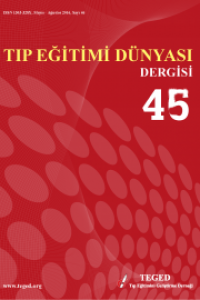Öz
Giriş: Gerçeklik Hakkındaki Tutumlar Ölçeği (Attitudes About Reality Scale), bireysel epistemolojideki farklılıkları ölçmek amacıyla kullanılan bir gereçtir. Ölçek Unger, Draper ve Pendergrass (1986) tarafından geliştirilmiş olup, bireylerin toplumsal gerçekliğin doğasına ilişkin tutumlarını mantıksal pozitivist ve sosyal yapılandırmacı yönelimler arasında değişen bir skalada değerlendirmeyi amaçlamaktadır. Ölçek, psikoloji ve eğitim alanlarında kullanılmaktadır. Türkçede tıp öğrencilerinin gerçekliğe yaklaşımlarını değerlendirmek amacıyla kullanılabilecek geçerlilik ve güvenilirlik çalışması yapılmış bir gerece rastlanmamıştır.
Amaç: Çalışmanın amacı, Gerçeklik Hakkındaki Tutumlar Ölçeği kısa formunun Türkçe uyarlamasının tıp fakültesi öğrencilerindeki geçerlilik ve güvenilirliğinin saptanmasıdır.
Yöntem: Çeviri-yeniden çeviri yöntemiyle Türkçeleştirilen ölçeğe Türk dili uzmanı ve pilot çalışmaya katılan öğrencilerin görüşleri de değerlendirilerek son şekli verilmiştir. Çalışma verisi Ekim 2015’te Dokuz Eylül Üniversitesi Tıp Fakültesi dönem 2 öğrencilerinden toplanmıştır. Elde edilen formlardan 210’u (N=317) analize uygun bulunarak veri çözümlemesine alınmıştır. Ölçeğin güvenilirliğini değerlendirmede Cronbach’s alpha ve yapı geçerliliğini değerlendirmede doğrulayıcı faktör analizi kullanılmıştır. Çalışma, Dokuz Eylül Üniversitesi Girişimsel Olmayan Araştırmalar Etik Kurulu tarafından onaylanmıştır.
Bulgular ve Sonuç: Doğrulayıcı faktör analiz sonucunda orijinal ölçekten on iki madde dışarıda kalmıştır. Elde edilen 16 maddelik, tek boyutlu ölçeğin Cronbach’s alpha katsayısı 0.716 olarak bulunmuştur. ‘Gerçeklik Hakkında Tutum Ölçeği’ olarak adlandırılan ölçeğin bu haliyle geçerli ve güvenilir bir ölçme gereci olarak kullanıma uygun olduğu düşünülmektedir.
Anahtar Kelimeler
Gerçeklik hakkındaki tutumlar ölçeği tıp eğitimi; geçerlilik; güvenilirlik
Kaynakça
- İnam A. Epistemiyatri kapısını açarken. Çotuksöken B, Tunçel A (Ed.), Bilgi Felsefesi içinde. 2010; 51-60. İstanbul: Heyamola.
- Beaton DE, Bombardier C, Guillemin F, Ferraz MB. Guidelines for the Process of Cross-Cultural Adaptation of Self-Report Measures. SPINE. 2000; 25(24), 3186–3191.
- Unger RK, Draper RD, Pendergrass ML. Personal Epistemiology and Personal Experience. Journal of Social Issues. 1986; 42(2), 67-79.
- Unger RK, Gareis KC, Locher PJ. Positivism and Patriotic Militancy: The Influence of covert ideologies on students’ reactions to September 11, 2001. Peace and Conflict: Journal of Peace Psychology. 2007; 13(2), 201-220.
- Harrison WD, Atherton CR. The attitudes about reality scale: A note on the use of logical positivism as a construct. The Journal of Social Psychology. 2001; 132(3), 335-341.
- Schermelleh-Engel K, Helfried Moosbrugger H, Müller H. Evaluating the fit of structural
- equation models: tests of significance and descriptive goodness of fit measures. Methods of Psychological Research Online 2003; 8(2): 23-74.
- Schumacker RE, Lomax RG. A Beginner's Guide to Structural Equation Modeling. New York: Taylor & Francis Group; 2010. p.85-90. Internet ulaşımı:
- http://www.rmcs.buu.ac.th/drpoonpong/file/A_Beginner's_Guide_to_Structural_Equation_Modeling_(Third_Edition).pdf
Öz
Introduction: Attitudes About Reality Scale is an instrument used for measuring differences in individual epistemology. The scale was developed by Unger, Draper and Pendergrass and aims to evaluate individuals’ attitudes on the nature of social reality in a scale varying between logical positivist and social constructivist tendencies (1). The scale is used in fields of psychology and education. A scale to assess medical students’ approaches to reality that satisfies validity and reliability criteria has never been encountered in Turkish.
Purpose: The purpose of this study is the adaptation of short form of Attitudes About Reality Scale to Turkish and to assess its validity and reliability on medical students.
Method: The scale was adapted to Turkish with translation re-translation method, and given its final form after evaluating the feedbacks of a Turkish language specialist and participating students in the pilot study. The data for this study had been gathered from 2nd term students in Dokuz Eylul University Medical Faculty in October 2015. Of the forms gathered, 210 (N=317) were found suitable and taken into data analysis. For assessing the reliability of the scale Cronbach’s alpha and for assessing construct validity confirmatory factor analysis were used. The study has been approved by Dokuz Eylul University Ethics Committee for Non-Interventional Research.
Findings and Conclusion: After confirmatory factor analysis, 12 items on the original scale were left out. The 16 item, one dimensional scale obtained, were found to have a 0.716 coefficient of Cronbach’s alpha. “Attitudes About Reality Scale” with its new format is considered a highly valid and reliable measurement instrument; appropriate to use.
Anahtar Kelimeler
Attitudes About Reality Scale Medical education; Validity; Reliability
Kaynakça
- İnam A. Epistemiyatri kapısını açarken. Çotuksöken B, Tunçel A (Ed.), Bilgi Felsefesi içinde. 2010; 51-60. İstanbul: Heyamola.
- Beaton DE, Bombardier C, Guillemin F, Ferraz MB. Guidelines for the Process of Cross-Cultural Adaptation of Self-Report Measures. SPINE. 2000; 25(24), 3186–3191.
- Unger RK, Draper RD, Pendergrass ML. Personal Epistemiology and Personal Experience. Journal of Social Issues. 1986; 42(2), 67-79.
- Unger RK, Gareis KC, Locher PJ. Positivism and Patriotic Militancy: The Influence of covert ideologies on students’ reactions to September 11, 2001. Peace and Conflict: Journal of Peace Psychology. 2007; 13(2), 201-220.
- Harrison WD, Atherton CR. The attitudes about reality scale: A note on the use of logical positivism as a construct. The Journal of Social Psychology. 2001; 132(3), 335-341.
- Schermelleh-Engel K, Helfried Moosbrugger H, Müller H. Evaluating the fit of structural
- equation models: tests of significance and descriptive goodness of fit measures. Methods of Psychological Research Online 2003; 8(2): 23-74.
- Schumacker RE, Lomax RG. A Beginner's Guide to Structural Equation Modeling. New York: Taylor & Francis Group; 2010. p.85-90. Internet ulaşımı:
- http://www.rmcs.buu.ac.th/drpoonpong/file/A_Beginner's_Guide_to_Structural_Equation_Modeling_(Third_Edition).pdf
Ayrıntılar
| Bölüm | Orjinal Araştırma |
|---|---|
| Yazarlar | |
| Yayımlanma Tarihi | 11 Haziran 2016 |
| Gönderilme Tarihi | 19 Nisan 2016 |
| Yayımlandığı Sayı | Yıl 2016 Cilt: 15 Sayı: 45 |


